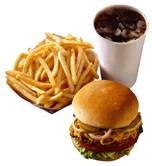 |
 |
 |
||
    |
||||
|
||||

Can't Control Junk Food Cravings? Blame the Brain
Study attributes level of willpower to cerebral differences|
|
HealthDay
By Robert Preidt
Friday, May 1, 2009
 FRIDAY, May 1 (HealthDay News) -- Two areas of the brain work together to give some people the self-control to reject unhealthy foods, a new study has found.
FRIDAY, May 1 (HealthDay News) -- Two areas of the brain work together to give some people the self-control to reject unhealthy foods, a new study has found.
California Institute of Technology researchers used MRI to scan the brains of volunteers as they looked at photos of dozens of types of foods and decided which ones they'd like to eat. They found significant differences in the brain activity between people who had self-control in terms of making food choices and those with no self-control.
Previous research has shown that an area of the brain called the ventromedial prefrontal cortex (vmPFC) is involved in all value-based decisions. When vmPFC activity decreases, a person will probably reject an item, whereas increased activity means they'll probably choose it.
The new study found that in people with no self-control, the vmPFC seemed to take into consideration only the taste of a food.
"In the case of good self-controllers, however, another area of the brain -- called the dorsolateral prefrontal cortex (DLPFC) -- becomes active and modulates the basic value signals so that the self-controllers can also incorporate health considerations into their decisions," principal investigator Antonio Rangel, an associate professor of economics, said in a CalTech news release.
The researchers noted that the vmPFC is active during every decision and that the DLPFC is more active when a person is using self-control.
"This, ultimately, is one reason why self-controllers can make better choices," Rangel said.
The study appears in the May 1 issue of Science.
HealthDay
Copyright (c) 2009 ScoutNews, LLC. All rights reserved.
Related News:
More News on this Date
Related MedlinePlus Pages:
| Home | Health Topics | Drugs & Supplements | Encyclopedia | Dictionary | News | Directories | Other Resources | |
| Disclaimers | Copyright | Privacy | Accessibility | Quality Guidelines U.S. National Library of Medicine, 8600 Rockville Pike, Bethesda, MD 20894 National Institutes of Health | Department of Health & Human Services |
Date last updated: 04 May 2009 |
